Alex Skovron
 Alex Skovron was born in Poland, lived briefly in Israel, and emigrated to Australia in 1958, aged nearly ten. His family settled in Sydney, where he grew up and completed his studies. From the early 1970s he worked as an editor for various book publishers in Sydney and Melbourne, in the reference, educational, children’s, trade, and literary fields. He was on the editorial staff of the third edition of The Australian Encyclopaedia (1972–77), and subsequently worked as general editor of The Concise Encyclopaedia of Australia (1977–79). On moving to Melbourne in 1980 he joined Macmillan as an educational editor, and from 1985 was senior editor with Hutchinson, Dent and Houghton Mifflin respectively. From the early 1990s he worked largely from home as a freelance editor. He is married, with two adult children and four grandchildren.
Alex Skovron was born in Poland, lived briefly in Israel, and emigrated to Australia in 1958, aged nearly ten. His family settled in Sydney, where he grew up and completed his studies. From the early 1970s he worked as an editor for various book publishers in Sydney and Melbourne, in the reference, educational, children’s, trade, and literary fields. He was on the editorial staff of the third edition of The Australian Encyclopaedia (1972–77), and subsequently worked as general editor of The Concise Encyclopaedia of Australia (1977–79). On moving to Melbourne in 1980 he joined Macmillan as an educational editor, and from 1985 was senior editor with Hutchinson, Dent and Houghton Mifflin respectively. From the early 1990s he worked largely from home as a freelance editor. He is married, with two adult children and four grandchildren.
Skovron’s poetry has appeared in many journals and anthologies in Australia and overseas. His six published collections to date are: The Rearrangement (1988, winner of the Anne Elder and Mary Gilmore awards for a first collection and shortlisted in the NSW Premier’s Awards), Sleeve Notes (1992), Infinite City (1999, shortlisted in the Age Book of the Year and Victorian Premier’s Awards), The Man and the Map (2003), Autographs (a volume of prose-poems, 2008), and Towards the Equator: New & Selected Poems (2014, shortlisted in the Prime Minister’s Literary Awards for 2015). Other awards for his writing have included the Wesley Michel Wright Prize for Poetry (twice), the John Shaw Neilson Poetry Award (twice), the Manuel Gelman Memorial Prize for Literature, and the Australian Book Review Poetry Prize. The numerous public readings he has given include appearances in China, Serbia, India, Ireland, Macedonia, Portugal, and on Norfolk Island.
Concurrently with his poetry, Alex Skovron has intermittently published in prose: a number of short stories, a novella, and the abovementioned Autographs, which can be read as a collection of microstories. The novella, titled The Poet (2005), was joint winner (with Kate Grenville) of the FAW Christina Stead Award for a work of fiction; it has been translated into Czech and published under the title Básník (2014). The Attic, a selection of his poetry translated into French by Jacques Rancourt, was published by PEN Melbourne in 2013; and Water Music, a bilingual volume of Chinese translations in the Flying Island series (Macau), came out in 2017. Some of his poetry has also been translated into Dutch, Polish, Spanish, Macedonian and German. His collection of short stories, The Man who Took to his Bed, was published by Puncher & Wattmann in 2017, and has been translated into Czech.
The Rearrangement
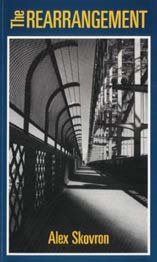 First published 1988 by Melbourne University Press (hardback, 112 pp., $19.95, out of print). Reprinted 1996 by Octave (paperback, 112 pp., $14.95). Available from the author.
First published 1988 by Melbourne University Press (hardback, 112 pp., $19.95, out of print). Reprinted 1996 by Octave (paperback, 112 pp., $14.95). Available from the author.
Alex Skovron's first collection of poetry presents a diverse poetic landscape in which some of the major preoccupations of our time are explored. Central to these is the journey towards self- knowledge. It is a journey that moves through the discovery, questioning, perhaps even judgment, of history's lessons, both personal and collective; through relationships, observed, intimate and estranged; through music, art and the creative impulse; through faith. The Old World, with its complex legacy, is a recurring concern.
Each of the three sections opens and concludes with a longer poem. Within and across the sections, themes overlap and echo, contend and mesh. By means of this framework, epitomized in the structure of the title poem, the circle of experience is drawn together. But the circle is never closed; like the pattern in the glass of a kaleidoscope, it remains restless, open, and ready always to rearrange itself into new patterns and possibilities.
"... the individuality of Skovron's voice is remarkable and disconcerting. Poems like these amount not so much to an extension of our poetic traditions as a rearrangement of them.”
— Philip Mead, Age"... a poet of great resourcefulness and erudition, one who brings to Australian poetry an originally European sensibility together with an impressive panache in the music he is able to make from English vowels and consonants."
— Alan Gould, Canberra Times"Like the Roman god of doorways, Alex Skovron's poetry faces both ways, towards both the past and the future. His conservative, discursive self is a courtly presence, like that of a highly civilized tutor to a princely house of the Enlightenment ... But under his radical aspect Skovron is a restless scientist of language, an inventor of beautiful new taxonomies and even a psychologist of violent impulses …
I have now read The Rearrangement many times and the riches it has to offer seem to me inexhaustible ... It can be strongly recommended to all readers of poetry, as well as to general readers who do not care for poetry, as a rule, but who like to have their intellect led on into fresh pastures and other lives."
— Chris Wallace-Crabbe, Australian Jewish News
Sleeve Notes
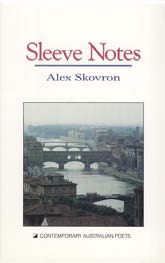 Published 1992 by Hale & Iremonger in association with Golvan Arts (paperback, 88 pp., $12.95, out of print). Available from the author.
Published 1992 by Hale & Iremonger in association with Golvan Arts (paperback, 88 pp., $12.95, out of print). Available from the author.
This highly orchestrated collection – in both the thematic and the musical sense – features three longer poems: the symphonic meditation ‘Quadrilateral’, the autobiographical sonnet sequence ‘The Waterline Poems’, and the twelve-part title suite inspired by the life and music of Mozart. These and the thirty-three other poems that make up the book offer a rich poetic journey – a journey that takes in Berlin and Beijing, Dublin and old Venice, Vietnam, Uluru and the Garden of Eden; a journey where Sisyphus and Nietzsche rub shoulders with Eliot and Hopkins, where Elgar and Mahler encounter Karl Marx and Clark Kent. We come across photographers and fools, flying-boats and fledgling poets, apples, chess games, grammarians, circuses and sleep; there are ants, moths and spiders, flowers and faces – the imagined, the actual and the surreal. And there are the shores of childhood, with their magic, their promise, and their song …
"Those who have not previously read this scrupulous and inventive poet will now have to do so, and those who already admire his work will find new depths and lustres in these fresh explorations into life, art, and the surprising exchanges to which they are subject ... Skovron's poetic voice – formal without undue formality, serious yet always open to wit and humour – has been recognized from the start as clear and companionable. With Sleeve Notes it becomes authoritative."
— Kevin Hart“The attentive may feel that some obscure plan is being played out around them (as indeed we know it is, in the more ambitious poems …). While a lot of the work stays covered, one begins to trust it because of its manifest care.”
— Les Harrop, Generation“There is a roundedness, a variety, to Skovron’s poetry that makes it both accessible and yet challenging … These are lucid and frequently moving poems, their language the controlled result of the often difficult marriage of passion and intellect.”
— Shane McCauley, Fremantle Arts Review
Infinite City
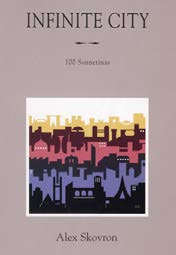 Published 1999 by Five Islands Press (paperback, 118 pp., $13.95). Reprinted 1999. Available from the author.
Published 1999 by Five Islands Press (paperback, 118 pp., $13.95). Reprinted 1999. Available from the author.
Infinite City is a collection of 100 poems in a ten-line form for which Alex Skovron has coined the name ‘sonnetina’. These sonnetinas speak in many voices, though certain motifs recur and intersect. Rhythm and colour shift from page to page; rhyme-schemes vary, or vanish; fact and invention jostle each other as the form is explored from many angles. The poems reflect upon time and destiny, on culture, language, sex, music and art, on the sacred and the mundane. They investigate terrains both social and inner, probing our daily confrontations with the self. The relation between thought, language, symbol and meaning is a central concern.
Although each sonnetina is self-contained, the book can be read as an unfolding journey through the realms and layers of experience. It can also be entered obliquely, along paths that subvert the printed sequence but uncover unexpected echoes and links; or dipped into at random, with individual poems rotated under the light.
“This book is remarkable in two respects: its high standard of craft, and its strong and flexible intellectual quality … The overall effect is of a fluid whole which is impressively large in its reach, both in tone and in thought.”
— John Leonard“Reading the poems singly, in their complete sequence or in their thematically-arranged groupings, the reader is rewarded by their extraordinary range of intellectual rigour, emotional experience and subject matter, as well as the satisfaction of encountering extremely accomplished poetry.”
— Marcelle Freiman, Australian Jewish News“Structurally, these are flawless poems: economical, and beautifully put together … [They are] almost like modern-day psalms.”
— Paola Bilbrough, Heat“… Infinite City is an impressive and masterly book.”
— Peter Boyle, Cordite
The Man and the Map
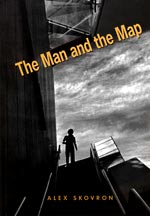
Published 2003 by Five Islands Press (paperback, 136 pp., $21.95). Available from the author.
In his fourth volume of poetry, Alex Skovron revisits many of the concerns explored in his earlier collections: history, language, music, our exchanges with one another, the everyday surrealities of life – and the elusive relation between memory, time and self. The poet probes the terrains of his own past (its truths and fictions), and navigates the territories beyond. His map encompasses the old world and the new; his journey traverses the crossroads of childhood, the webs of adolescence, the jolts and comedies of experience. It takes in strange landscapes and illustrious cities, restless dreams and ghostly fantasies, the outskirts of eternity and the road to hell. Across the horizon, like a distant range discerned from a moving train, hovers the shifting backdrop of the twentieth century.
“This is Skovron’s fourth book of poetry, and he continues to delight and astonish the reader with his deft and elegant work.”
— Ian McBryde, Artstreams“It is the author’s ability to use the quick and ‘dangerous’ metaphor, efficiency of form and subtle but insistent flow which brings each poem to unique life … Skovron is able to encapsulate an image in a fleeting and angular manner, not unlike the shutter of the photographer or well-placed brush stroke of the painter.”
— Kevin Gillam, Five Bells“Irrespective of its subject, a Skovron poem manifests fundamental decency, self-awareness and civilisation ….”
— Oliver Dennis, Island
Autographs
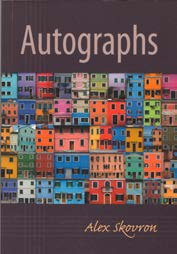
Published 2008 by Hybrid Publishers (paperback, 80 pp., $19.95).
The 56 prose-poems that make up this collection explore provinces of the self – time and the allure of memory, the mosaics and masks of identity, fantasy’s realms, eros and the affections, the will to imagination, our shifting perspectives on ‘reality’. The autographs vary in tone and texture, colour and pulse; some resemble miniature stories, others are freely autobiographical, while others again present strange tableaux, searching meditations, or introduce a named, presumably fictitious protagonist. Of especial interest to the author are the poetic dimensions and musical possibilities of prose. While the order of the pieces across the book’s three sections has been carefully plotted, they all stand as self-contained compositions linked, sometimes, by recurring motifs and echoes from one voice to another. Autographs is a book of many voices – and of the many signatures that underwrite our times.
“Whether hyperbolic, philosophical, satiric, elegiac, nostalgic or autobiographical in theme, these prose-poems cast you adrift, far from the usual; and yet some invisible poetic pulley hauls you back to shore at the end of each page. Every metrical, grammatical, punctuated, alliterative, slant-rhymed nuance contributes to these elegant sculptures that hold together into tableaux of mesmerising virtuosity … The skill is breathtaking. The erudition unapologetic. As Bacon said to Burnleigh in a letter in 1592, ‘I’ve taken all knowledge to be my province’ … I believe this book is a masterpiece of prose-poetry.”
— Jennifer Harrison, launch speech“Visually, the poems on the page resemble small opaque lakes, patterned with tiny ripples. Reading the collection feels like diving into water with barely a splash. This poetry flows where it wants to go, it invites a sense of immersion, a weightlessness. Like listening to music there is aesthetic pleasure in following the long, uninterrupted lines of melody, shifts in tone and pace across the collection.”
— Susan Fealy, Cordite“In Autographs, Skovron demonstrates how the prose poem can do things which are impossible both in traditional lineated poetry and in normal prose fiction.”
— Geoff Page, Canberra Times“Skovron’s achievement in Autographs is to have crafted poems that are at once intimately personal and yet reach beyond this to offer a mysterious vision of the world.”
— Cameron Lowe, Mascara
The Poet
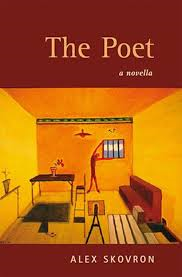
Published 2005 by Hybrid Publishers (paperback, 144 pp., $19.95).
The Poet is a tale of obsession, art, and the thresholds between day and night. Manfred is a nondescript insurance clerk, inflexibly honest and imbued with a profound sense of order. He is also a prolific poet, but has never tried to publish – until now. The novella traces the events and experiences that befall Manfred in the wake of a single moment’s carelessness, a mistake that will change his life. He enters a maze he must negotiate, between action and paralysis, inspiration and despair, guilt – and the phantom, love. We encounter an eccentric stranger bent on a terrible mission, the publisher of a deceitful new author, and the city that forms a living, shifting backdrop to the interior drama, as Manfred struggles with his predicament, his muse, and the labyrinth of his implacable honesty. It is a journey from common daylight into a darkness flickering with both hope and oblivion; a journey across the fragile web of what we understand as sanity.
“It is a novella about the individual and the city; about the loss of meaning; about the way in which people are driven and altered by circumstances they cannot control. Manfred’s astonishing and sometimes irritating naïveté questions the kinds of sophistications most of us take for granted and how we would survive without them.”
— Paul Hetherington, Australian Book Review“It is a resonant, perplexing tale of loss, love and complexity – a discomfiting, sometimes heartbreaking book that rejects conventional formulaic storylines in favour of other possibilities. Like its protagonist, it is honest in ways that shatter comfort zones. And, like its protagonist, it is gifted with dazzling moments of grace.
The Poet is a work of art (note as well the fine cover painting, also by the author). It is a work to be savoured, and yet my first reading was voracious, accomplished in a single sitting, for in addition to succeeding as literature, The Poet is also a gripping and compelling page-turner …”
— Deborah Miller, Australian Jewish News“This book has a lot of light in it, it reads with seamless clarity and precision, is a wonderfully realised style, but there is also a darker set of echoes in it. And a pathos that I was, even after several readings, truly hit by. This is a terrific new addition to the small list of Australian novellas, the ones, I mean, that are so memorable; but even saying that, in Australian fiction it is unique ... You will be ever so subtly changed."
— Philip Salom, launch speech
The Attic
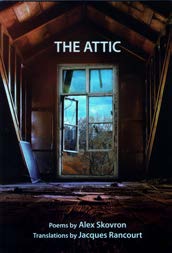
Published 2013 by PEN Melbourne (paperback, 48 pp., $10.00). Bilingual (parallel text), with translations by Jacques Rancourt. Reprinted 2014.
‘I translate the books of a famous author / before they are written. …’ So begins the title-poem of this parallel-text edition of ten poems by Alex Skovron, with French translations by Jacques Rancourt. Although the selection is not large, it traverses a rich poetic terrain in which some of the poet’s most pressing concerns are explored. The voices of night mingle with importunings from the past and memories of the future; the familiar grows suddenly strange; faith and fable challenge belief; myth and reality quietly intersect; there is longing, and loss, there is music, and the end of time; even a tree that grows from the sky. These are poems that probe the shades and borderlines of our lives, re-imagining who and what we are.
“The Attic is classy. In it, we hear the genetic code of jazz … These poems know what Django Reinhardt did about composition and an itinerant ‘Manoir’ between realms, what Bix Beiderbecke knew about time signature and form … and when a train might come, and what Eddie Condon knew about artfully breaching all of the above when needed. All the arrangements involved in this book seem to spell your name.”
— Kent MacCarter, launch speech
Towards the Equator: New & Selected Poems
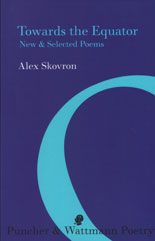
Published 2014 by Puncher & Wattmann (paperback, 312 pp., $29.95). Reprinted 2015, 2016, 2017.
This New & Selected Poems is a substantial and long-awaited compilation from one of Australia’s most accomplished poets, a retrospective spanning more than thirty years. The New Poems section, ‘Towards the Equator’, represents Alex Skovron’s sixth book-length collection and signals a return to the formal variety that has been a hallmark of his work. As always, a distinct Eurocentric sensibility sits alongside an engagement with Western art and culture. All six collections are characterized by close attention to craft, versatility of tone and technique, and a seriousness of intent seasoned at times with wry humour or playful wit. We encounter a rich assortment of voices, moods and scenarios as the landscapes of experience, the playgrounds of the mind and the theatres of the self are negotiated. Music, memory, philosophy, the creative spirit and language itself are focal-points; the dimensions of faith and the elusive quest for self-knowledge colour the shifting light; while Eros, in various guises, accompanies many of the poems across the plains and borderlands of the imagination. Recurring motifs in Skovron’s poetry include the perpetual tussle with history, the search for a clarity of vision, and our often ambiguous relationship with identity, with each other, and with the enigmas of time and remembrance.
“… all his poetry urbanely values the articulate and the clarified; the complex and the made. It asserts the importance of recognising human contradictions and problems while appreciating civilisation. For Skovron, words are so much part of being and doing that the world is unimaginable without them – and music is always there as an abiding and ineffable ‘mysterious song’.”
— Paul Hetherington, Australian Book Review“Perhaps what is most interesting about Skovron, to me, is how easily he moves between poems embedded in history and the sacred to poems of the everyday. It is hard to think of another poet who can occupy the mystical realm … as readily as the mundane world …”
— Caitlin Mailing, Cordite“The value of such a generous selection as this is that it allows a reader, especially one new to the poet's earlier works, to get a sense of what has gone on over the years. Skovron has been remarkably consistent in output – a book every five years or so – and in his concerns and style. This is not to say his work lacks variety; quite the reverse, but the way of thinking and feeling is always distinctive.”
— Peter Kenneally, The Age“[The poems] show a leisurely but steady development of a highly intelligent poet who has always been looking for new (but not meretricious) ways to write, a poet who takes his art seriously as a way of understanding the world and communicating to readers what he can of the awareness so gained. Although he came to Australia from Poland, via Israel briefly, when he was 10, Skovron’s temperament and aesthetics have remained strongly European.”
— Geoff Page, Weekend Australian“Though never a poet of the easy answer or swaggering insight, Skovron’s poetry does constitute, among many other things, a search for wisdom – a search which engages many different poetic forms and voices, which finds expression in a superb array of subtly-differentiated emotional states, and in strikingly diverse cultural registers, from ‘difficult’ erudition to an instantly-intelligible phrase …
The book sometimes reads like a vast whispering gallery of voices, some named, some not; some seeming close to Alex Skovron’s own personal voice; others mysterious, or exotic, creations of his wonderfully rich imagination …
In Skovron’s poetry, one of the high roads – perhaps the highest road of all – to re-enchantment is music, and there is rewarding scholarly work to be done on the many thematic and allusive ways in which music appears constantly in this poetry, and on the relationship between music and the musicality of Skovron’s poetic language …
And indeed memory is another major Skovron theme, sometimes disclosed with an almost Proustian sense of human consciousness’s fabulously rich and swooping life in time …”
— Richard Freadman, Australian Poetry Journal
Water Music
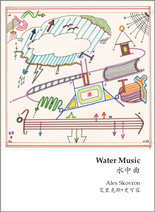
Published 2017 by Flying Island Books: ASM and Cerberus Press (paperback, 66 pp, $10.00).
A diverse, bilingual selection of twenty poems chosen from Alex Skovron’s earlier books and rendered into Chinese by Hong Kong–based translator Xu Daozhi.
The Man who Took to his Bed
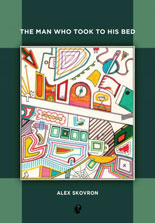
Published 2017 by Puncher & Wattmann (paperback, 160 pp., $29.95).
A man wakes up one morning to find an unknown woman in bed beside him. A failed writer devises an ingenious method of plagiarizing the work of others. Whole properties in a suburban neighbourhood begin vanishing overnight. An ancient grand piano is purchased by a mysterious young customer with an old secret. A spontaneous experiment in the paranormal produces an unexpected result …
This collection of fourteen short stories is Alex Skovron’s second book of fiction, after his novella The Poet (2005). It introduces an eclectic range of protagonists, predicaments, voices, and narrative styles – playful, earnest, speculative, ironic, intimate, bittersweet, surreal. Between them, the characters we meet span childhood and adolescence, adulthood and old age, and their stories highlight the untoward in the everyday, the transformative in the mundane, the twists and turning-points that can challenge us – and the games we play with others, and with ourselves.
“Intricate, dreamy, deeply literate stories that unsettle the senses and stir the intellect.”
—Helen Garner“By turns beautifully detailed, puzzling and always intriguing, the hauntingly solitary tone of these exquisitely observed stories induces a rare meditative attentiveness in the reader. It is a powerfully affecting collection that left me eager to explore more of Skovron’s world.”
—Alex Miller
“In Alex’s short stories, I take 'difficulty' in the modernist context to mean writing that foregrounds its brevity by being fragmentary in style, by refusing resolution, and by defying familiar forms of understanding the everyday. Readers of these stories will also find shifting intellectual perspectives – psychoanalytical, gender-oriented, deconstructive. I also take 'difficulty' to refer to his stories that deliberately contravene readers’ expectation in playfully emphasizing that interpretation might not be possible – and indeed is perhaps unwarranted.”
—Michelle Borzi, launch speech“… a collection worth exploring for its attentiveness to language and to the nuance of place, the eccentricities, let alone bizarreness, of the quotidian spaces in which we sleep, wake, and move. Skovron locates the absurd in the lives of people trying to make their own strange and mutable patterns in the meanings of everyday rituals and places.”
—Jill Jones, Australian Book Review